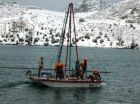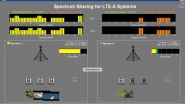(Press-News.org) Nearly all organisms contain pieces of DNA that do not really belong to them. These "transposable elements", so called because they are capable of moving around within and between genomes, generally represent a drain on the host's resources and in certain cases may lead directly to disease, e.g. when they insert themselves within an essential host gene. The factors that govern the spread of transposable elements within a population are broadly understood but many of the finer points remain unclear. New work at the University of Veterinary Medicine, Vienna (Vetmeduni Vienna) may pave the way to a more profound knowledge of the intracellular battle that is constantly being played out between the host and invading DNA.
Robert Kofler and Andrea Betancourt in Schlötterer's group at the Vetmeduni Vienna's Institute of Population Genetics used new sequencing technologies to examine the variation in transposable elements within a population of fruit flies. Similar investigations had been undertaken previously but the scientists incorporated a number of refinements to ensure that their analysis considered both known and previously unknown sites of insertion. For the first time, the researchers were able to catalogue all the transposable elements in a population of flies. And importantly they were also able to determine how frequently transposable elements occur at each particular site of insertion.
The findings were dramatic. The flies contain transposable elements at a large number of sites in the genome, although many insertion sites are affected in relatively few individuals. These are presumably sites of recent insertion and only the future will tell whether the elements are maintained there. Some older insertion sites are widespread but the majority seem not to be "fixed" in the population. In other words, most transposable elements are somehow purged before they become established. Schlötterer sums up the results by stating that "the genome is like a record of past wars between hosts and the parasitic DNA. There have been waves of attacks and the majority of them have been repelled, with only few transposable elements managing to survive and spread throughout the population."
Even more surprisingly, the scientists found about a dozen sites of insertion that were more frequent in the population than would be expected from their age (assessed via a different method). It seems, then, that there is positive selection for transposable elements at these sites, suggesting that insertion has a beneficial effect on the host. Such an effect had previously been shown for two insertions that give increased resistance against insecticides and these cases were refound by Schlötterer's analysis. The functions of the genes closest to the remaining insertions are highly diverse, so how the transposable elements may benefit the flies is unclear. As Schlötterer puts it, "perhaps we shouldn't really think of transposable elements as parasites at all. They represent a way for organisms to increase their genetic repertoire, which may be advantageous in helping them meet future challenges."
###
The paper Sequencing of Pooled DNA Samples (Pool-Seq) Uncovers Complex Dynamics of Transposable Element Insertions in Drosophila melanogaster by Robert Kofler, Andrea J. Betancourt and Christian Schlötterer has just been published by the open access journal PLoS Genetics.
The scientific article in full text online (Open Access):
http://www.plosgenetics.org/doi/pgen.1002487
About the University of Veterinary Medicine, Vienna
The University of Veterinary Medicine, Vienna is the only academic and research institution in Austria that focuses on the veterinary sciences. About 1000 employees and 2300 students work on the campus in the north of Vienna, which also houses the animal hospital and various spin-off-companies.
http://www.vetmeduni.ac.at
Scientific contact:
Prof. Christian Schlötterer,
christian.schloetterer@vetmeduni.ac.at
Tel. 43-1-25077-4300
Contact:
Klaus Wassermann
klaus.wassermann@vetmeduni.ac.at
Tel. 43-1-25077-1153
Parasites or not? Transposable elements in fruit flies
2012-02-06
ELSE PRESS RELEASES FROM THIS DATE:
Sediments from the Enol lake reveal more than 13,500 years of environmental history
2012-02-06
A team of Spanish researchers have used different geological samples, extracted from the Enol lake in Asturias, to show that the Holocene, a period that started 11,600 years ago, did not have a climate as stable as was believed.
The Holocene period, which includes the last 11,600 years of our history, has always been described as a stable period in terms of climatic conditions, especially when compared to the abrupt changes that occurred in the last ice age, which ended around 10,000 years ago, giving way to the Holocene.
A study carried out by researchers from the Pyrenean ...
Jointly utilizing LTE networks
2012-02-06
Smartphones and tablets are some of the big sellers of the past year. Mobile Internet usage has increased rapidly with the sales success: according to a study of the industry association VATM, in 2011 the average data volume per mobile Internet user increased by 82 percent in Germany. In contrast to its predecessor UMTS, with the new LTE mobile radio standard, the clearly higher data rates and the shorter signal transmission times, providers want to cover the expected traffic. That is why the expansion of the LTE network is being pursued aggressively. Providers are setting ...
Making sense of addiction terminology
2012-02-06
London, UK – A new editorial released this week offers clarity and structure on confusing drug and alcohol addiction terminology for prescribers, users and regulators. "Through a glass darkly: can we improve clarity about mechanism and aims of medications in drug and alcohol treatments?" is published in the Journal of Psychopharmacology, the official journal of the British Association for Psychopharmacology, published by SAGE.
David Nutt and Anne Lingford-Hughes of Imperial College London's Neuropsychopharmacology Unit together with Jonathan Chick from Queen Margaret ...
Collective action
2012-02-06
If you wanted to draw your family tree, you could start by searching for people who share your surname. Cells, of course, don't have surnames, but scientists at the European Molecular Biology Laboratory (EMBL) in Heidelberg, Germany, have found that genetic switches called enhancers, and the molecules that activate those switches – transcription factors – can be used in a similar way, as clues to a cell's developmental history. The study, published today in Cell, also unveils a new model for how enhancers function.
Looking at fruit fly embryos, Guillaume Junion and Mikhail ...
Judder-free videos on the smartphone
2012-02-06
The journey for the family holiday can be a long one. To avoid the incessant "Are we there yet?", stressed parents gladly hand their smartphones to the back seat – so the kids can watch videos or movies on the internet. While modern technology provides for entertainment, it occasionally reaches its limits and then the whining returns: The movies sometimes judder, or are completely interrupted. The cause may be twofold: If the user is standing at the basin of a valley and has poor reception, the data stream transmission rate is inadequate and the cellphone cannot download ...
Surface of Mars an unlikely place for life after 600 million year drought, say scientists
2012-02-06
Mars may have been arid for more than 600 million years, making it too hostile for any life to survive on the planet's surface, according to researchers who have been carrying out the painstaking task of analysing individual particles of Martian soil. Dr Tom Pike, from Imperial College London, will discuss the team's analysis at a European Space Agency (ESA) meeting on 7 February 2012.
The researchers have spent three years analysing data on Martian soil that was collected during the 2008 NASA Phoenix mission to Mars. Phoenix touched down in the northern arctic region ...
Global extinction: Gradual doom is just as bad as abrupt
2012-02-06
A painstakingly detailed investigation shows that mass extinctions need not be sudden events. The deadliest mass extinction of all took a long time to kill 90 percent of Earth's marine life, and it killed in stages, according to a newly published report.
Thomas J. Algeo, professor of geology at the University of Cincinnati, worked with 13 co-authors to produce a high-resolution look at the geology of a Permian-Triassic boundary section on Ellesmere Island in the Canadian Arctic. Their analysis, published Feb. 3 in the Geological Society of America Bulletin, provides strong ...
Soy isoflavone supplements did not provide breast cancer protections
2012-02-06
PHILADELPHIA -- Soy isoflavone supplements did not decrease breast cancer cell proliferation in a randomized clinical trial, according to a study published in Cancer Prevention Research, a journal of the American Association for Cancer Research.
Lead researcher Seema A. Khan, M.D., professor of surgery at the Robert H. Lurie Comprehensive Cancer Center of Northwestern University, said the results of this study are consistent with the findings of previous studies that were designed to test cancer prevention benefits of dietary supplements.
"Simply put, supplements are ...
Dignity counts when caring for older people
2012-02-06
Older people feel that their health problems pose a challenge to their sense of independence, dignity and identity and sometimes the health care they are given makes things worse.
According to research funded by UK Research Councils' New Dynamics of Ageing programme (NDA), healthcare providers must avoid taking a 'blanket view' of how to help older people cope with the ageing process.
The study carried out by Dr Liz Lloyd and her colleagues found that people were often surprised by the impact that illness and growing old had on their lives. Their sense of 'self' was ...
Lower levels of sunlight link to allergy and eczema
2012-02-06
Sunshine may help to prevent allergies and eczema
Increased exposure to sunlight may reduce the risk of both food allergies and eczema in children, according to a new scientific study published this week.
Researchers from the European Centre for Environment & Human Health, along with several Australian institutions, have found that children living in areas with lower levels of sunlight are at greater risk of developing food allergies and the skin condition eczema, compared to those in areas with higher UV.
The research team used data from a study of Australian children ...



